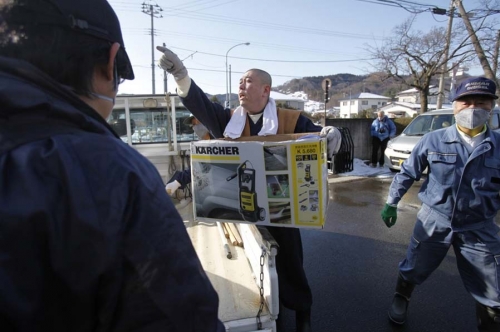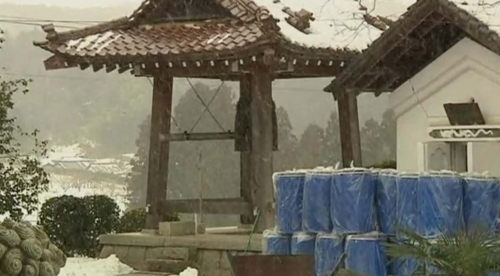Sad news from the Maldives this week, an islands-nation that lies southwest of India. The Maldives, though now strictly Islamic, was Buddhist until the 12th century. In recent political turmoil, during which the first democratically elected president in the country’s history resigned (he says he was forced to), six men entered the National Museum and smashed almost 30 Buddhist statues, some of which were over 1,500 years old. A New York Times article reports on the loss:
Ali Waheed, the director of the National Museum, which was built by China as a gift to the country, said on Monday that officials might be able to restore two or three of the damaged statues, but that the rest were beyond repair. ‘The collection was totally, totally smashed,’ Mr. Waheed said. ‘The whole pre-Islamic history is gone.’ (…)
Naseema Mohamed, a historian who retired from the museum last year, said the loss was particularly devastating because many of the country’s ancient artifacts, dispersed across the archipelago, had been lost or destroyed over the years by local people and rulers. ‘There was very little left,’ she said. (…)
Both Ms. Mohamed and Mr. Waheed said that in recent years, some conservative Muslims had suggested removing the statues from the museum, but that there had never been any threats made over the statues. Abdul Majeed Abdul Bari, who was minister of Islamic affairs for the Maldives until last week, said that the country’s laws specifically exempt ancient figures from the regulations governing idols. ‘This is our heritage, and it has to be protected for future generations,’ he said.
A similar situation in a different area of the globe has been brought to the attention of Tricycle editors. We received an email earlier in the week from Alexandr Berezin, president of the Diamond Way Karma Kagyu Buddhist center in Kachkanar, Russia. Their 17-year-old monastery, Shad Tchup Ling, and its two stupas are in danger of being appropriated and destroyed by a big business ore-dressing and processing enterprise, which is extracting minerals from the mountain on which the monastery and stupas sit.
Mr. Berezin wrote,
Since the moment of our religious organization’s official registration 10 years ago the enterprise has consistently blocked our attempts to register the small piece of land on the top of the mountain as our property. In the last few months the enterprise has tried to appropriate the land for its own needs (but according to the documents we received there are no minerals in the area under our monastery).
The chief of the enterprise made it clear that if they receive the land, all our buildings including the stupas will be demolished and the people permanently living on that land evicted. The local administration is unable to stop this process as the enterprise’s owner is Evraz Group S.A., which has much more financial and political power than the town of Kachanar and our community. The predatory tendencies of big business have negatively
influenced the Russian society for the last 20 years.Concerning Orthodoxy, the authorities and big business try to treat it with respect and, if possible, support it. One cannot say the same about other confessions, including Buddhism. In our case, the representatives of the large company believe that they can destroy non-Orthodox religious sacred objects freely and without a twinge of conscience, trampling on the region’s spiritual traditions and feelings of Russian Buddhists. In order to make this action legal the enterprise wants to appropriate the land. There was a period in this country’s history when Buddhist temples and stupas were destroyed intentionally—it was the period of Stalin’s repressions against religions. It happened then due to wrong views. Now it is avarice that threatens Buddhism. (…)
The leaders of the enterprise and the holding company don’t probably realize how dangerous the execution of their plans is. They cannot estimate the extent of social consequences such actions may cause in our country. We have already written to heads of the largest religious organisations in Russia and to the Sangha of Mongolian Buddhists. We hope that you appeal to the enterprise’s leaders and make it clear for them that it’s not just our community who cares for our small monastery, but many Buddhists abroad, too. The enterprise is certainly able to adjust its working plans in such a way that the small piece of land on the hard-to-reach rocky top of the mountain would stay a place of Buddha’s teachings and wouldn’t be destroyed.
To contact Evraz and express your concern about the appropriation of Shad Tchup Ling monastery, here is the company’s media relations number (+44 207 832 89 98 for London; +7 495 937 68 71 for Moscow), as well as the media relations email (media@evraz.com). If anyone can find more appropriate contact information, please let us know! And in the meantime, get on your Twitter feeds and Facebook walls! Let’s help any way we can.
Sometimes it’s hard, I know, to feel like it’s possible to make a difference, especially when confronting behemoths like big businesses or natural disasters. But for a little Friday inspiration, I’d like to share the story of Koyu Abe, a Japanese monk. As reported by Reuters and MSNBC, Abe is working with a team of volunteers to clean up radioactive hotspots in Fukushima, one of the nuclear meltdown sites in the Japan 2011 tsunami and earthquake. Here is Abe, out of his robes and directing his team:

Because the government refuses to handle the radioactive soil Abe’s team picks up, the monk has to store it at his own temple (this is a screenshot from a Reuters video about his work):

Abe has also distributed 8 million sunflowers and sunflower seeds to help clean up the area—sunflowers are supposed to soak up radioactive toxins from the soil.
He says in the Reuters video, “Our mission at the temple is to make the happy things even happier. And as much as we can, shoulder those that cause sorrow, as far as possible allowing people to escape their grief. That’s the essence of our work. So to that end, no effort is too much, be that time or anything else.”
Hear hear!